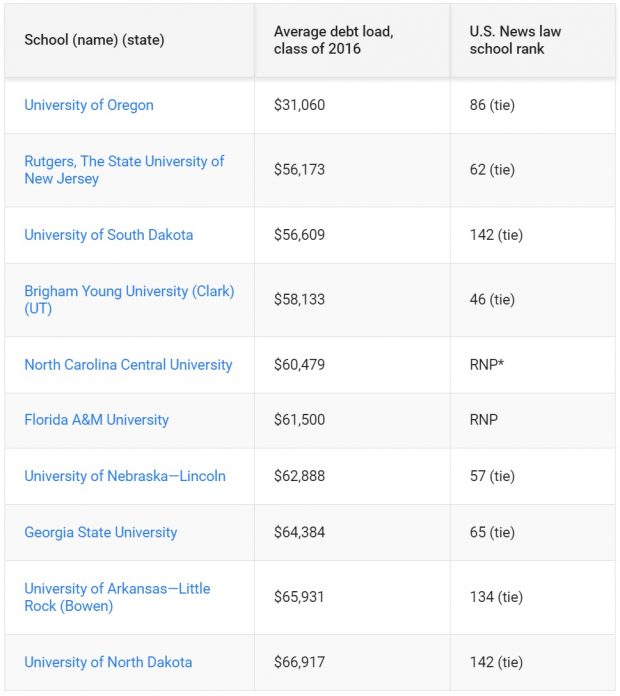The Law Schools With The Least Indebted Graduates (2017)
Which law schools won't damn graduates to a lifetime of debt?
 Despite calls for lower tuition, the cost of a legal education is still absurdly expensive. At the vast majority of law schools, a law degree can run the average graduate a sum in excess of six figures. In fact, according to the most recent data reported to U.S. News, new graduates of public law schools have an average debt of $90,217, while graduates of private law schools have an average debt of $130,349.
Despite calls for lower tuition, the cost of a legal education is still absurdly expensive. At the vast majority of law schools, a law degree can run the average graduate a sum in excess of six figures. In fact, according to the most recent data reported to U.S. News, new graduates of public law schools have an average debt of $90,217, while graduates of private law schools have an average debt of $130,349.
At some law schools, a degree is even more costly. Take, for example, the average 2016 graduate of Thomas Jefferson School of Law, who has about $182,411 in debt — the most debt of all ranked law schools — and a 21.9 percent chance of working as an attorney in a full-time, long-term job 10 months after graduation. These numbers are absolutely terrifying.
In a world where the average class of 2016 law school graduate carries a debt load of $112,389 (down just slightly from an average of $112,748 for the class of 2015), there must be a few schools out there that won’t destroy a would-be lawyer’s financial footprint forever. There must be some hope for those considering a J.D. who don’t want to damn themselves to a lifetime of debt.

Is The Future Of Law Distributed? Lessons From The Tech Adoption Curve
Which law school graduates have the least debt of all? U.S. News has a ranking for that. One hundred eighty-one schools provided debt data to the magazine, and the average debt at the 10 schools with the least indebted graduates was $58,407 (that’s $53,982 cheaper than the average debt for all 2016 graduates).
These are the 10 law schools where 2016 graduates had the lowest average debt:

Before you get too excited, we would be remiss if we didn’t mention that just because you’ll be likely to leave these law schools with a lower debt load, it doesn’t mean you should drop everything to run and apply. Here are the relevant employment statistics — the percentage of graduates in full-time, long-term jobs where bar passage was required 10 months after graduation (excluding school-funded positions) — for the class of 2016 at the 10 law schools where recent graduates have lower than average debt loads. Check them out:
Sponsored

Early Adopters Of Legal AI Gaining Competitive Edge In Marketplace

The Business Case For AI At Your Law Firm


Legal AI: 3 Steps Law Firms Should Take Now

The Business Case For AI At Your Law Firm

- Oregon: 50.4 percent
- Rutgers: 72.8 percent
- South Dakota: 70.7 percent
- BYU: 56.3 percent
- North Carolina Central: 35 percent
- Florida A&M: 37.5 percent
- Nebraska: 65.3 percent
- Georgia State: 67 percent
- Arkansas (Little Rock): 50.4 percent
- North Dakota: 51.3 percent
Unfortunately, it seems that even if you attend a law school that leaves its graduates with a lower than average debt load, it’s still a 50/50 toss-up in most cases as to whether you’ll actually be employed as a lawyer. But look on the bright side: at least if you don’t have a job, your overall debt burden won’t be as worrisome as it could have been if you attended a more expensive law school.
10 Law Schools Where Grads Have the Least Debt [The Short List / U.S. News]
 Staci Zaretsky has been an editor at Above the Law since 2011. She’d love to hear from you, so please feel free to email her with any tips, questions, or comments. You can follow her on Twitter or connect with her on LinkedIn.
Staci Zaretsky has been an editor at Above the Law since 2011. She’d love to hear from you, so please feel free to email her with any tips, questions, or comments. You can follow her on Twitter or connect with her on LinkedIn.
Sponsored

Navigating Financial Success by Avoiding Common Pitfalls and Maximizing Firm Performance








